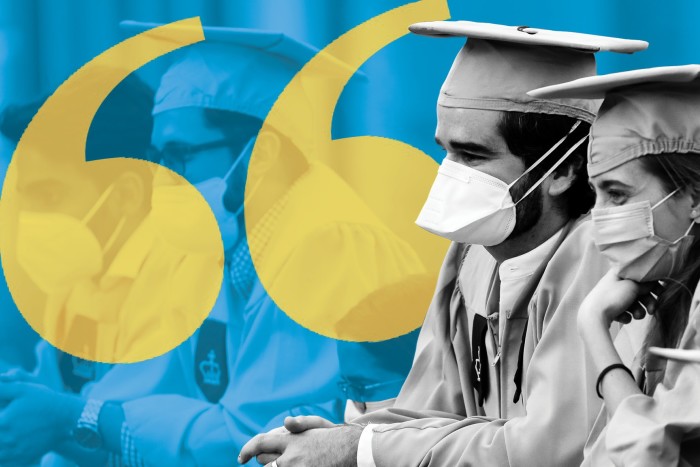How the middle class became downwardly mobile

Simply sign up to the Life & Arts myFT Digest -- delivered directly to your inbox.
Watching TV series during the endless evenings of the pandemic, I’ve been struck by a recurring theme: family downward mobility. In the US series Arrested Development, the jailing of the conman patriarch dismays his adult children, who had expected to live off the family business for ever. “Great,” grumbles his daughter, “so now we don’t have a car or a jet? Why don’t we just take an ad out in I’m Poor magazine?”
In Schitt’s Creek, another ruined family goes to live in its last asset: the eponymous podunk small town that they had bought as a joke. In Years & Years, members of an impoverished British family move in with the grandmother in her rambling, dilapidated house. In Lena Dunham’s Girls, the twenty-something main character is told by her mother that she will no longer support her. Dunham retorts, horrified: “All my friends get help from their parents.”
The topic of younger generations living precariously off family wealth clearly has particular appeal to TV writers, who are educated people in a precarious profession. But it’s also the middle-class theme of our time, amid the second economic meltdown in 13 years. What is the combination of downward mobility and widespread inheritance doing to families, ambitions and societies?
When asset prices outstrip wages in developed economies, the result is an “inheritance society”. The economist Thomas Piketty points out in Capital in the Twenty-First Century that what we’re seeing is a reversion to the historical norm: in most epochs, the vast bulk of wealth comes from inheritance, not work. Piketty says the exception was the postwar era: once the Great Depression and the second world war had decimated family wealth, there was little left to inherit.
But there is now. In Britain, the ratio of housing wealth to GDP is higher than Japan’s before its 1991 crash. “On average, inheritances will be worth 9 per cent of household lifetime (non-inheritance) income for those born in the 1960s, rising to 16 per cent for those born in the 1980s,” projected the UK’s Institute for Fiscal Studies last week. Some $68tn in wealth is estimated to change hands in America alone by 2042, in large part as baby boomers die, according to Cerulli, a research firm. That’s surely the biggest collective wealth transfer in history.
No wonder many of today’s most compelling dramas revolve around inheritance: the Trump family saga, the Harry-and-Meghan story, the TV series Succession (loosely based on the Murdoch family) or Patrick Radden Keefe’s new book Empire of Pain, about the Sackler family, who made billions from the deadly painkiller OxyContin.
This is a return to the storylines of the 19th century, another era when assets trumped wages: Balzac and Jane Austen dramatised inheritances, too, notes Piketty. The difference is that nowadays there are fewer big heirs and far more small ones — “petits rentiers”, Piketty calls them. For large swaths of the middle class, inheritance has downgraded salary to something of an afterthought.
That’s especially true for younger people. Many millennials have made the terrible discovery that a bachelors degree is the new high-school diploma. Fifty years ago, a bank manager or teacher or lawyer was a big shot guaranteed a big house. Nowadays people in those jobs can find themselves living in their childhood bedrooms, struggling to please lesser-educated parents who control the pot of gold. Family wealth solidifies family hierarchies. And with life expectancy generally rising (except in the US), these hierarchies remain intact longer than in any previous era.
Have you recently graduated? Tell us about the jobs market

The FT wants to hear from graduates and other young people about their experiences of getting their careers off the ground in these uncertain times. Tell us about your experiences via a short survey.
Ground zero for family dependency is Italy, where the average child leaves home aged 30. With the Italian birth rate sliding to 1.32 children per woman even before collapsing during the pandemic, families are dying out, which diminishes the need to save. So bourgeois families consume their wealth, the generations clamped together in a perverse embrace.
Many professions staffed by educated people — academia, cultural industries, graphic design — now pay so little that even with a small inheritance, the younger generation descends in class. Having to sell the family home can be a source of shame and lost memories, says the French writer Lisa Vignoli, whose novel of downward mobility Les déclassés appears next January.
The moment of inheritance often destroys the family. A friend of mine who carries out painting valuations says fights between siblings over who gets what are the norm. Richer heirs can drift into aimlessness, reluctant to work for underwhelming salaries that they don’t need. Inactivity can breed inferiority complexes: while their working peers tend to become more capable in middle age, many heirs just become irrelevant.
Those who take over the family business often find themselves in over their heads. Tellingly, four of the 12 football-club owners behind the disastrous plan for a European Super League were heirs. A fifth, Steven Zhang, 29-year-old president of Inter Milan, had been handed the club by his billionaire father.
Yet the themes of downward mobility and heirdom transcend families. Years & Years depicts an entire downwardly mobile country, the UK. Add on the pandemic and climate change, and that’s currently the world.
Follow Simon on Twitter @KuperSimon and email him at simon.kuper@ft.com
Follow @FTMag on Twitter to find out about our latest stories first.
Comments